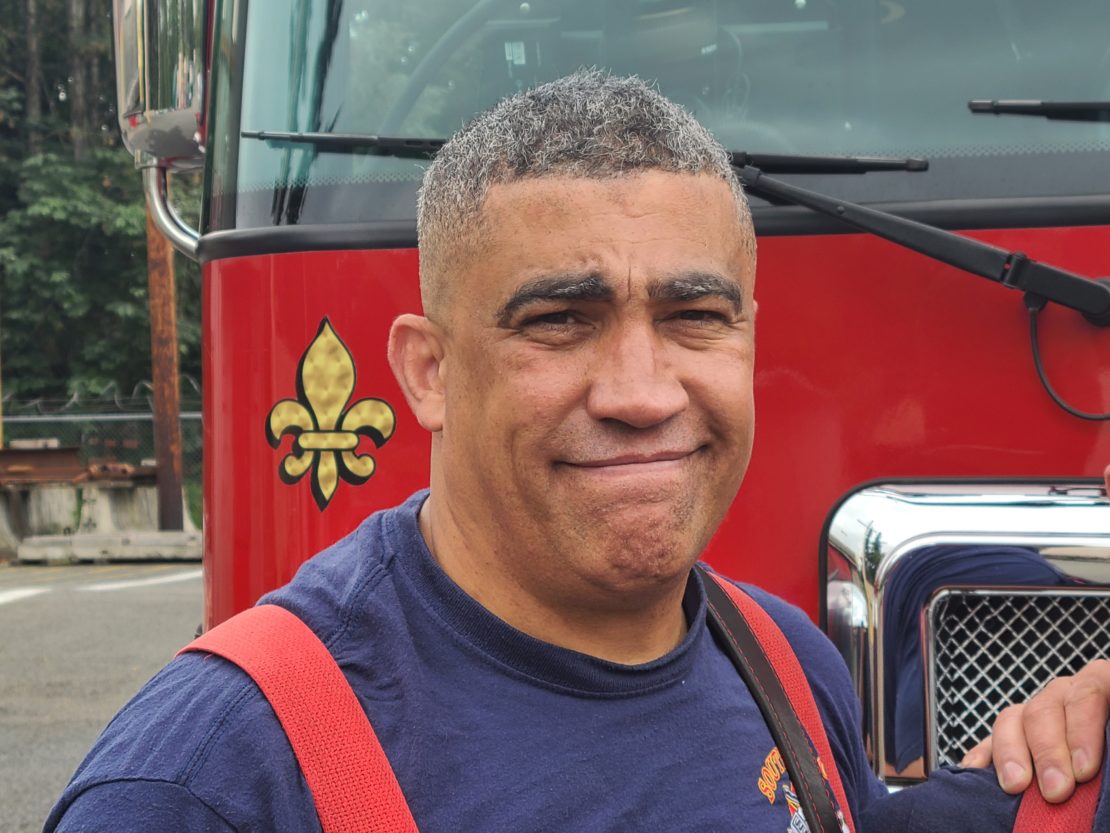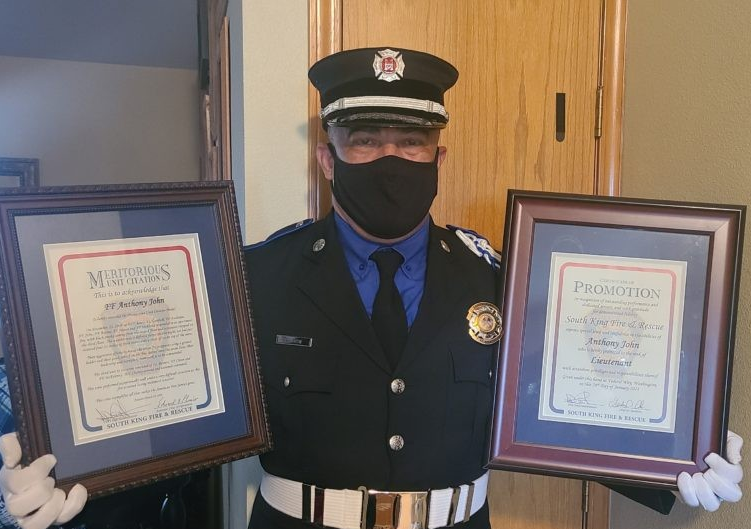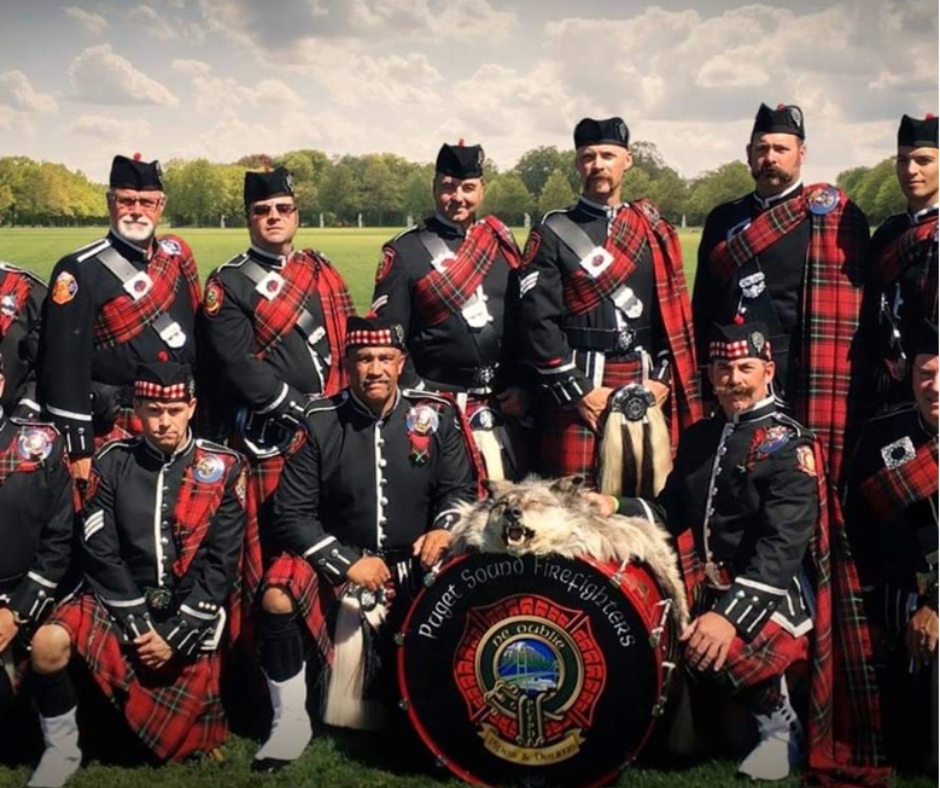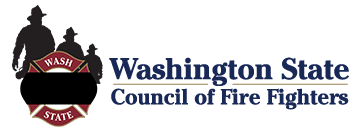
February is Black History Month, a time to honor the dedication, service, and contributions of our Black WSCFF members. Their impact strengthens our profession and communities, and we celebrate them this and every month.
With over 25 years in the fire service, Anthony John, L2024, has dedicated his career to serving both his community and the next generation of fire fighters. A station captain with South King Fire and Rescue, he is currently assigned to Station 64 as a member of the technical rescue team. Beyond his operational role, Anthony is an Honor Guard commander, an extrication instructor with the Puyallup Extrication Team, and a bass drummer for Puget Sound Firefighters Pipes and Drums. Since 2004, he has led his department’s informal mentorship program, working to recruit and guide future fire fighters. He is also a member of the WSCFF Diversity, Equity and Inclusion Committee.
Meet Anthony John
What motivated you to become a fire fighter?
My motivation to become a fire fighter started when I was very young, when a crew came to my elementary school. The fire fighters let us flow water and other things, and that’s when I got the itch, as they say. It wasn’t until working security at the El Dorado in Reno, Nevada, when I started to put effort behind pursuing a career in the fire service. I met a retired Fire Marshall from Yakima who advised me to go to Washington State for a job. Just so happens that I met my future wife, who was from Washington State, in Reno. When I asked her to move to Reno, she said no, so I moved to Washington State and started volunteering with Federal Way Fire.
I’m motivated by being able to help others — both internally and externally — to get to where they want to be. Every day is a great day to be motivated.

How has your identity and background shaped your experience in the fire service?
My background and identity were that of a poor kid from the “Bay Area” of California. My father died when I was 11, and so my mom raised me and my brother at an early age. Being from a tough area, there were few options to being successful: sports, jail, or death. My mom made it a point to keep us active in sports. I was fortunate enough that sports got me out of a tough situation, and into the University of Nevada Reno where I ran track and field. So, in short: my background of having to fight and work hard to reach my dream job turned my identity into a person who fights for family and those less fortunate.

Why is representation important in the fire service? How does it impact the communities you serve?
Representation is very important for the fire service. We serve everyone – not just one culture over another. Having people with different experiences, backgrounds, and skill sets only adds value to a job that can be simple or complex based upon what you are called to do. The impact to our communities adds value when the people who show up to solve problems have different skills, knowledge and experiences. Being able to make a situation better by our presence, and by what we do, makes my community have confidence in my fire department. My community knows that when they call us, we will help facilitate a positive outcome when we can!

How have you seen diversity and inclusion evolve in the fire service over the years?
I have seen diversity and inclusion struggle to get traction during my tenure in the fire service. In recent years I have seen a more diverse group of people getting hired, but as a fire service we still struggle to promote diversity and inclusion in the workplace. A lot of traditions still get in the way of progress. As most fire fighters know, we are our own worst enemies with change, or things remaining the same. We get comfortable instead of pushing our limits. I’m hopeful that there will come a day when we can get past everything. Where we can have discussions or conversations to improve diversity and inclusion within the fire service.

What advice would you give to young African American or BIPOC individuals considering a career as a fire fighter?
My advice to African American communities or any BIPOC (Black/indigenous/people of color) community is to find a mentor in the fire service. Someone who wants to see you have a successful career in the fire service. You will still have to put all effort into getting it, but with a person who knows the workings of this job to help applicants avoid pitfalls and navigate them through the process is key. Research where you want to work based on what you like about a department or its surroundings. Never give up! Testing is challenging. The general timeframe is long, and the challenges can be immense. Above all, have confidence in what you want to obtain in life.

How can the fire service strengthen its connection with Black communities and better support inclusion?
Strengthening connections with BIPOC communities and better supporting inclusion starts with being intentional in your community. It starts with community involvement, and not just during an emergent time or situation. Some thoughts I’ve heard is “We give good customer service when on a call, isn’t that enough?” The fire service has many opportunities to strengthen its connections, and they must be intentional and relational.

What does Black History Month mean to you personally and as a fire fighter?
To me, Black History Month means an opportunity to recognize the accomplishments of those who have affected positive change or contributions to our lives. As a fire fighter, Black History Month means a moment to reflect on how I’m personally affecting change within my department, as well as the fire service in general.

In closing, I’m thankful for my job, the people, and the opportunities that my career has given me. As a senior fire fighter, I know that there is always change. We need to learn to embrace it and make things better for all.

